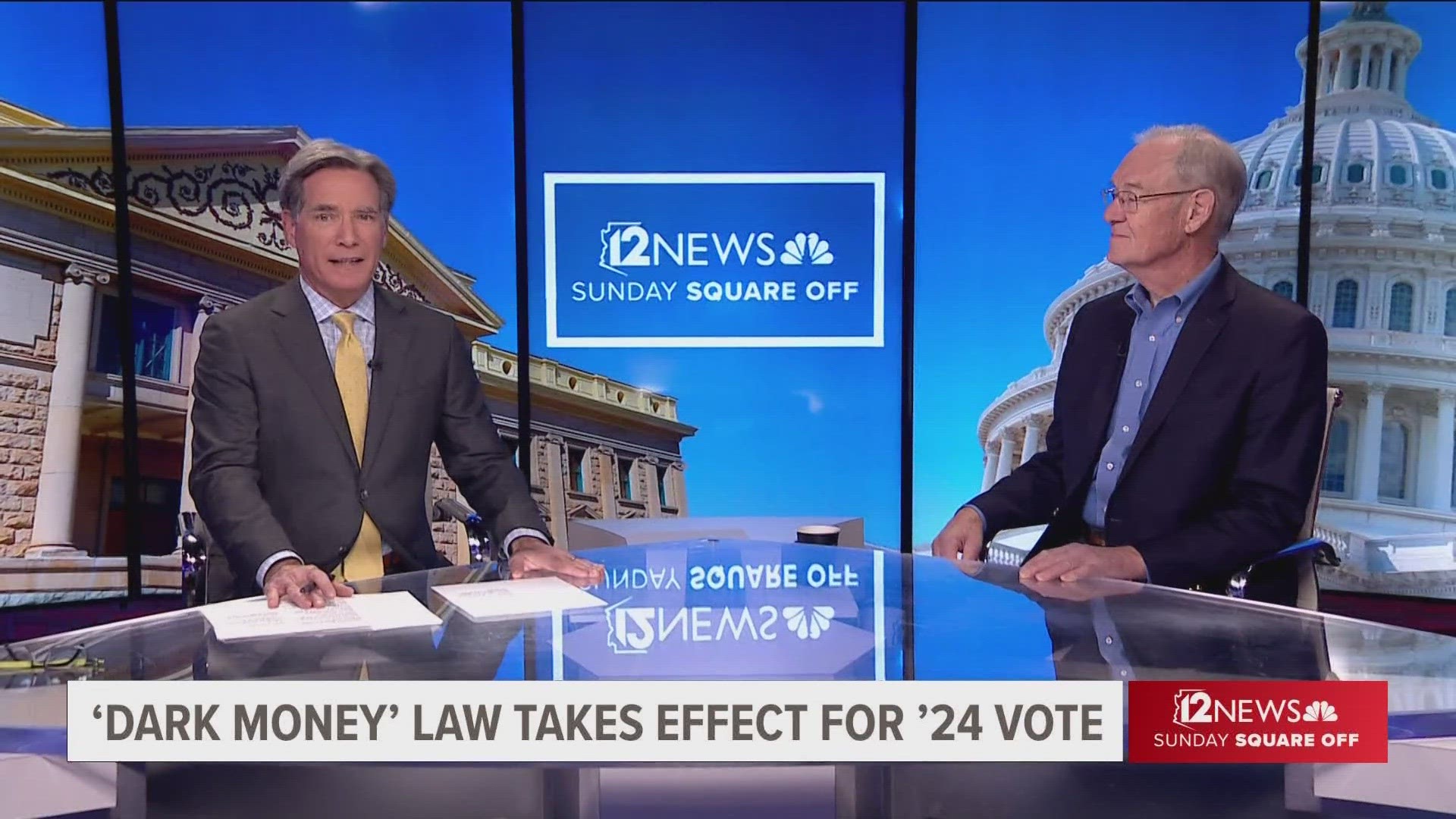PHOENIX — Two years ago, Arizona voters demanded to know the names of so-called "dark money" donors who influence our elections.
Now, during the 2024 election campaign, voters will find out if the Prop 211 ballot initiative they overwhelmingly approved actually works.
"There is no right to hide in Arizona if you're a contributor that wants to ... put your thumb on the scale and influence the results of an election," former Attorney General Terry Goddard, the leader of the Prop 211 campaign, said on this weekend's "Sunday Square Off."
"The voters will be armed with information about who's supporting the candidates on the ballot."
In an era where we don't agree on much, the Voters' Right to Know Act was approved in 2022 with 72% of the vote. The ballot initiative won in a landslide in all 15 Arizona counties - red and blue - with at least a 2 to 1 victory margin.
Here are four things to know about the law:
What does the law cover?
The law applies to statewide, countywide, legislative and municipal elections or campaigns.
Campaign finance rules for federal campaigns, such as the race for the U.S. Senate, are regulated by the Federal Election Commission.
Under the new Arizona law, any group that spends more than $50,000 in statewide campaigns or $25,000 on non-statewide campaigns on political media advertising and related spending will be required to disclose the original sources of donations exceeding $5,000, according to the non-partisan Campaign Legal Center, which collaborated with Goddard on the initiative and has defended the law in court.
Campaign ads would be required to include a disclaimer disclosing the top three donors, if the spending is covered by the law.
Who tracks campaign ad spending?
The Arizona Secretary of State's office posts campaign spending reports at this site.
The disclosure law's impact might not be apparent for a few more months, once spending by election and issue campaigns ramps up.
"As of this week, the Secretary of State has the necessary information on the website so that when you're filing your campaign contribution reports, it will be clear that you have to give the original source of major contributions," Goddard said.
Counties and cities also maintain their own campaign finance sites.
The next deadline for filing campaign finance disclosures is Jan. 15.
Who enforces the law?
The voter-approved Arizona Citizens Clean Elections Commission has the authority to investigate complaints. According to Goddard, the commission can levy fines of up to three times the amount that isn't properly disclosed.
But Goddard says the media and the voters themselves are the ultimate enforcers.
Voters "overwhelmingly passed this," he said. "They want to know who's behind these ads on TV and everywhere else.
"The bottom line is that they need to be diligent, too. We're not going to be able to pass the buck to some anonymous enforcer. I think folks have to say, 'Look at the disclosures and make your own determination about whether people are being honest.'"
Is the legal fight over?
Probably not.
While the law is effective, legal challenges seek to block it.
Lawsuits in state courts have failed.
"They basically left no room for doubt that this proposition is legal," Goddard, a former two-term attorney general, said of the judges who have ruled on the challenges.
"Disclosure is absolutely allowed under the Constitution in Arizona. Disclosure was in our original Constitution in 1912. So it's not like we're bringing on something new. We're repairing some of the damage that's been done over the years."
A Federal Court lawsuit, filed by Americans for Prosperity, a conservative funder aligned with the Koch network, is viewed as a potential test case for the U.S. Supreme Court.
The lawsuit, filed 10 months ago against the Clean Elections Commission and Secretary of State Fontes, has been dormant for several months as litigation in state courts plays out.
Americans for Prosperity lawyers argue that the Voters' Right to Know law "trammels" donors' First Amendment rights by "subjecting countless Americans nationwide to governmental doxxing for doing nothing more than supporting their chosen non-profit organizations and charities."
"The folks behind Americans for Prosperity have the biggest dogs on the porch," Goddard said.
"They want to protect their franchise, which is a dark money franchise."
Up to Speed
Catch up on the latest news and stories on the 12News YouTube channel. Subscribe today.

